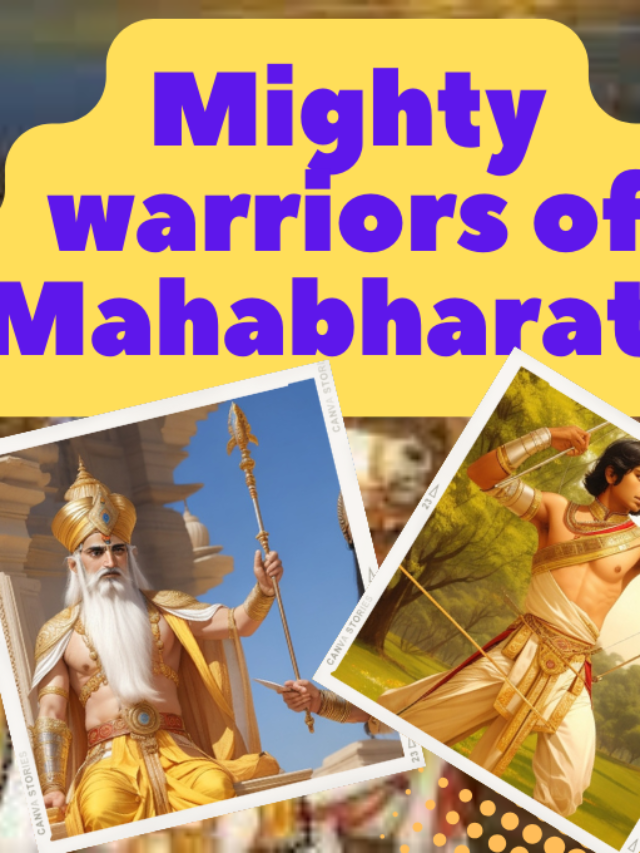The epic tale of the Mahabharata is a timeless narrative steeped in history and mythology. It unfolds a saga of honor, duty, and valor amidst the turmoil of the Kurukshetra War. Among its many illustrious characters, we delve into the lives and exploits of the top10 Most Powerful Warriors who participated in this epic battle. Excluded from this list is Lord Krishna, the supreme deity and incarnation of Lord Vishnu, as he stands above all the creatures of the Mahabharata.
The top 10 mighty warriors of Mahabharata
These 10 Most Powerful Warriors in Mahabharata, each with their unique attributes, contributed to the epic battle that defines the essence of the Mahabharata.
1. Bhishma: The Immovable Warrior
In the annals of epic tales, the name Bhishma stands as a symbol of unwavering loyalty and indomitable will. Bhishma’s bravery in battle, blessed with the boon of choosing the time of his death, was beyond comparison. His exceptional skill with weapons, combined with his unwavering sense of duty and code of ethics, made him an iconic figure in the timeless epic of the Mahabharata. Even as he lay on a bed of arrows during the tumultuous Kurukshetra War, Bhishma’s spirit remained unbroken, showcasing his unmatched resilience.
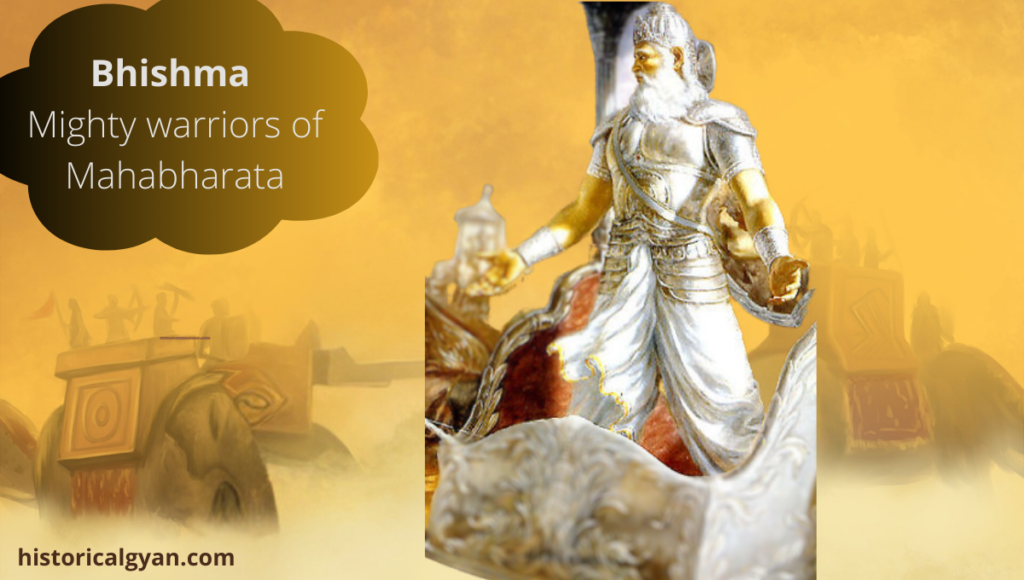
Bhishma’s Legendary Training and Indestructibility
Bhishma, often hailed as the most consummate warrior trained by Parashurama himself, possessed a divine aura of invincibility. His indomitable will and unmatched combat skills made him indestructible by any ordinary warrior when he wielded his weapons. Having defeated his own preceptor, Parashurama, and all the kings of the earth, he stood as the revered Commander in Chief of the Kuru Army. Bhishma’s vast knowledge of military tactics and strategic formations in those ancient times was unparalleled. Only a select few, including Drona, Krishna, Karna, and Arjuna, could even be compared to the vast knowledge that Bhishma possessed.
The Battle of Kurukshetra: Bhishma’s Unyielding Might
Amidst the chaos of the Kurukshetra War, there emerged a warrior whose power surpassed even the mightiest in the epic tale. Bhishma, born of Ganga and Shantanu, assumed the role of a grandfather to both the Pandavas and the Kauravas. In his pursuit of righteousness and loyalty, Bhishma fought a great battle with Parashuram for an astonishing 23 days. During this monumental clash, Bhishma wielded the formidable Praswapan weapon, a weapon so potent that none could counter its devastating force. Even Parashuram himself acknowledged his inability to match Bhishma’s prowess in wielding this weapon.
Bhishma’s feats on the battlefield were nothing short of extraordinary. He once achieved the remarkable feat of cutting off 1013 arrows launched by Lord Parashuram, a testament to his unmatched skills and reflexes. Every day of the Pandavas’ struggle, Bhishma left a trail of destruction in his wake, slaying ten thousand soldiers and thousands of chariots. His formidable opponents included renowned warriors like Arjuna, Abhimanyu, Bhima, Ghatothkach, Satyaki, and many others.
The Divine Dilemma: Bhishma’s Resolve Tested
Bhishma’s unyielding spirit and unparalleled combat prowess were so formidable that even Lord Krishna himself was on the verge of breaking his vow of not picking up any weapon during the Kurukshetra War. Such was the might of Bhishma that it took divine intervention to confront him on the battlefield. In the end, Bhishma’s relentless onslaught claimed the lives of a staggering one lakh soldiers from the Pandava camp in just ten days.
Bhishma, the epitome of unshakable resolve and unwavering loyalty, left an indelible mark on the Mahabharata’s tapestry. His unparalleled might, combined with his unbreakable principles, makes him an enduring legend in the annals of history.
2. Arjuna: The Peerless Archer
In the grand tapestry of the Mahabharata, Arjuna shines as a luminous star among the contenders. Revered as a masterful archer, his legendary prowess on the battlefield earned him the epithets “Partha” and “Kaunteya.” Armed with his celestial bow Gandiva, bestowed upon him by Shiva himself, Arjuna demonstrated unparalleled dexterity and accuracy in archery. His unwavering focus and unerring aim enabled him to perform feats that seemed supernatural. Arjuna’s bravery, as displayed in the Kurukshetra war, is a testament to his ability.
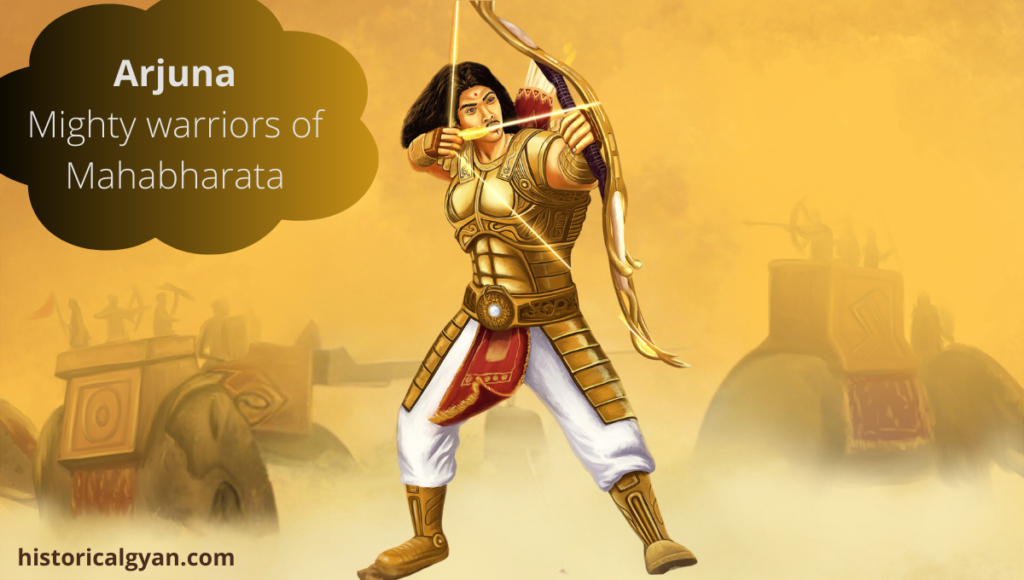
Arjuna’s Divine Blessings and Heroic Exploits
Arjuna, the son of Indra and considered the incarnation of Nara, was one of the greatest warriors of the Pandava camp. His divine lineage and celestial blessings set him apart as a formidable force on the battlefield. Arjuna’s exceptional skills in archery were further enhanced when he pleased Lord Shiva, who granted him the personal celestial weapon, Pashupatastra. His journey to heaven led to the acquisition of all celestial weapons from Lord Indra and other gods, augmenting his already formidable arsenal.
The Conquest of Heroes: Arjuna’s Triumphs
Arjuna’s prowess knew no bounds, as he emerged victorious in numerous battles throughout the epic saga. In the Yudhister’s Rajasuya Yagya, he defeated many kings, asserting his dominance as a warrior of unparalleled skill. The Kurukshetra War witnessed Arjuna’s unparalleled martial prowess, where he slew formidable opponents such as Bhishma, Bhagadatt, Jayadrath, Karna, and many others.
Notably, on the 14th day of the war, Arjuna achieved a remarkable feat by vanquishing seven Akshauhini armies on the Kauravas’ side, showcasing his unrivaled combat abilities. He faced formidable warriors like Bhishma, Karna, Drona, Ashwatthama, and emerged victorious, solidifying his status as one of the greatest archers in history.
Arjuna: The Unwavering Hero
Arjuna’s indomitable spirit and unmatched archery skills make him an everlasting symbol of heroism and valor. In the grand epic of the Mahabharata, his name resonates as the epitome of a warrior’s unyielding dedication to righteousness and duty.
3. Karna: The Generous Suryaputra
The story of Karna in the Mahabharata is a tapestry woven of complexities. Born to Kunti and Surya Dev, Karna’s journey was full of challenges and dilemmas. His generosity and bravery on the battlefield were great, as were his skills as a warrior. Equipped with divine armor and earrings, Karna’s loyalty to Duryodhana and display of martial prowess make him a compelling contender for the title of most powerful warrior.
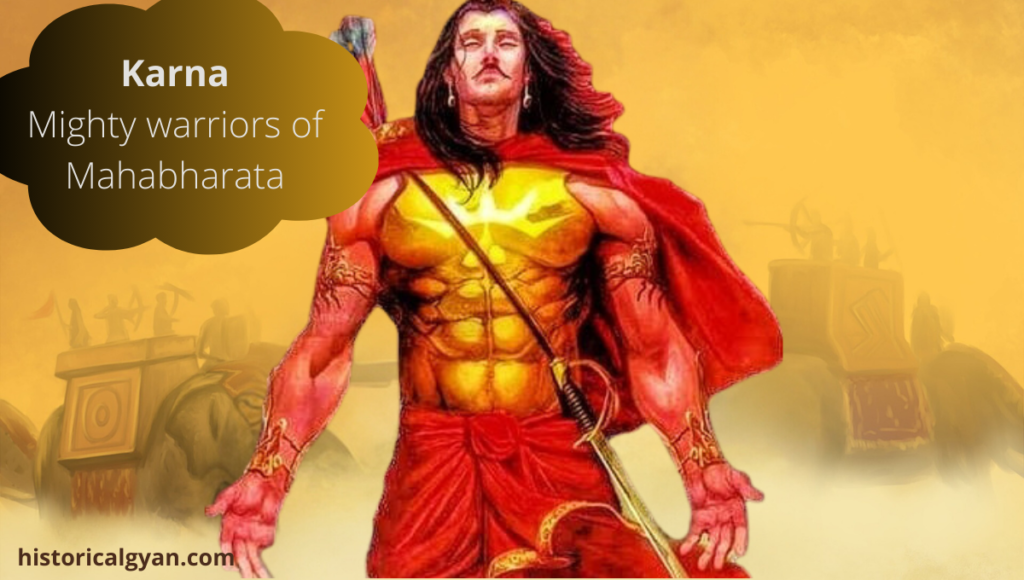
Karna’s Divine Endowments and Unmatched Skills
Karna, the son of Surya, was born with the divine Kavach and Kundal, impervious to any weapon. His selfless act of donating his Kavach and Kundal to Lord Indra showcased his boundless generosity. In return, Lord Indra bestowed upon him the Shaktiastra, a weapon capable of slaying immortals. This powerful weapon played a pivotal role in the war, as Karna used it to vanquish the rampaging Ghatotkacha on the 14th day.
Karna’s martial prowess was often considered equal to that of Arjuna. According to Lord Krishna, Karna possessed the qualities of all five Pandavas – the righteousness of Yudhishthira, the strength of Bhima, the war skills of Arjuna, the handsomeness of Nakula, and the wisdom of Sahadeva. He wielded the Vijaya bow, a weapon once held by Lord Shiva himself.
Karna’s Heroic Exploits
Karna’s legacy in the Mahabharata is etched with remarkable victories and extraordinary feats. In his Digvijay conquest, he conquered the entire world, standing as a symbol of Duryodhana’s might. Karna’s battlefield triumphs included defeating formidable warriors like Bhagdatt, Satyaki, Kritaverma, Narayani Sena, Gandharvas, Trigartas, and many others.
In the heat of the Kurukshetra War, Karna faced Ghatothkach, countering the latter’s thousand illusions and defeating him twice. His encounter with Arjuna was nothing short of epic, as he nearly killed Arjuna twice with his Sarpamukhi arrow and Brahmastra. Karna’s tenacity and strength shattered Arjuna’s celestial defenses, a feat that even gods like Indra could not achieve.
Karna’s list of defeated opponents was extensive, including warriors like Arjuna, Bhima, Satyaki, and Ghatothkach. He even captured Yudhishthira in a single attempt, a task that eluded both Bhishma and Drona. Throughout the Kurukshetra War, Karna’s valor and prowess were second to none, making him an enduring legend in the Mahabharata.
4. Dronacharya: The Guru of Warriors
A guru par excellence, Dronacharya’s contribution to the art of war was immeasurable. As the teacher of both the Pandavas and Kauravas, Dronacharya’s skills were unparalleled. His mastery over weaponry and military strategy was evident in the skills of his disciples. While he didn’t possess the celestial weapons of some of the other warriors, his strategic acumen and ability to train extraordinary fighters make him a force to be reckoned with.
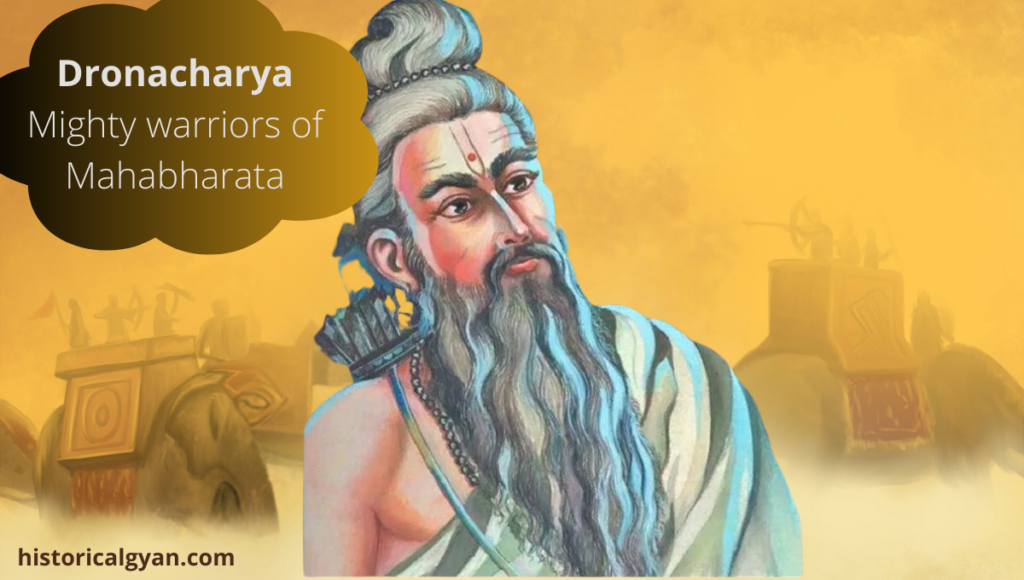
Dronacharya: The Master of Vedic Military Arts
Dronacharya’s legacy as a great master of Vedic military arts is undisputed. His expertise extended to the mastery of almost every celestial weapon known. A unique attribute that set him apart was his invulnerability as long as he held a weapon of any sort. This invincibility made it exceedingly challenging for anyone to defeat him in combat. Notably, Dronacharya’s deep religious knowledge and wisdom added to his multifaceted persona.
As the revered teacher of both the Pandavas and Kauravas, Dronacharya played a pivotal role in shaping the destiny of the Kurukshetra War. Arjuna, in particular, was his favorite student, and under his tutelage, Arjuna blossomed into one of the greatest warriors of his time.
Dronacharya’s Battlefield Exploits
Dronacharya’s battlefield exploits were nothing short of extraordinary. He singlehandedly decimated more than one Akshauhini army of the Pandava side. His list of defeated opponents included illustrious warriors such as Drupad, Virat, Dhrishtaketu, Satyajit, and many others.
Even warriors of the caliber of Arjuna and Bhima found themselves challenged by Dronacharya’s prowess. His strategic brilliance and combat skills made him a formidable adversary on the battlefield. His refusal to teach Karna, owing to Karna’s non-royal lineage, laid the foundation for the intense Karna-Arjuna rivalry that would define the epic tale.
In the grand narrative of the Mahabharata, Dronacharya’s contribution as a teacher and warrior remains an indelible testament to his greatness.
5. Ashwatthama: The Immortal Warrior
Ashwatthama, a name synonymous with both awe and dread, was a warrior of unparalleled might and mystique in the Mahabharata. As the avatar of one of the eleven Rudras, he bore the curse of immortality, an eternal existence marked by both power and torment. Born with a gem in his forehead, Ashwatthama possessed dominion over all living beings below the human realm. This gem rendered him impervious to attacks by ghosts, demons, poisonous insects, snakes, and even animals. Ashwatthama’s role in the Kurukshetra War was pivotal, culminating in a night raid on the 18th day, where he ruthlessly slaughtered the remaining Panchala army and the sons of the Pandavas.
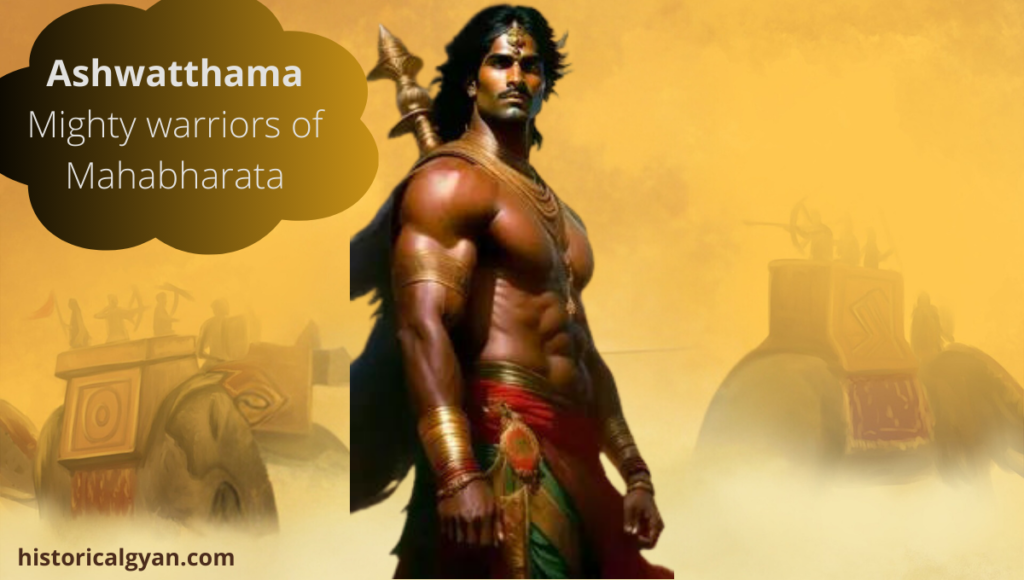
Ashwatthama: The Son of Drona
Ashwatthama was the son of Drona and Kripi, inheriting his formidable skills and knowledge from his illustrious father. His deep understanding of divine weapons made him a partial incarnation of Lord Shiva himself. Among his many celestial armaments, Ashwatthama possessed the Narayanastra and the Brahmashirsha Astra, both of which were devastatingly powerful and capable of causing cataclysmic destruction.
Ashwatthama’s Feats on the Battlefield
Ashwatthama’s legacy as a warrior was defined by his extraordinary feats in the Kurukshetra War. He singlehandedly annihilated three Akshauhini armies of the Pandava side, leaving a trail of destruction in his wake. His martial prowess extended to defeating formidable warriors like Satyaki, Bhima, and others.
One of the most infamous episodes in the Mahabharata was Ashwatthama’s night raid on the 18th day of the war. In a merciless and ruthless assault, he killed all the remaining Panchala warriors and the sons of the Pandavas while they slept. This act, born of vengeance and rage, marked one of the darkest moments in the epic saga.
Ashwatthama’s presence on the battlefield was a constant reminder of the potent forces at play in the Mahabharata, where the line between hero and villain often blurred.
6. Ghatotkacha: The Formidable Rakshasa
Ghatotkacha, born of Bhima and Hidimbhi, inherited his formidable strength and mystical abilities from his rakshasa heritage. His sheer size and shape-shifting abilities made him a formidable presence on the battlefield. Most notably, Ghatotkacha possessed the extraordinary power to create a thousand types of illusions, confounding his enemies and wreaking havoc among their ranks.
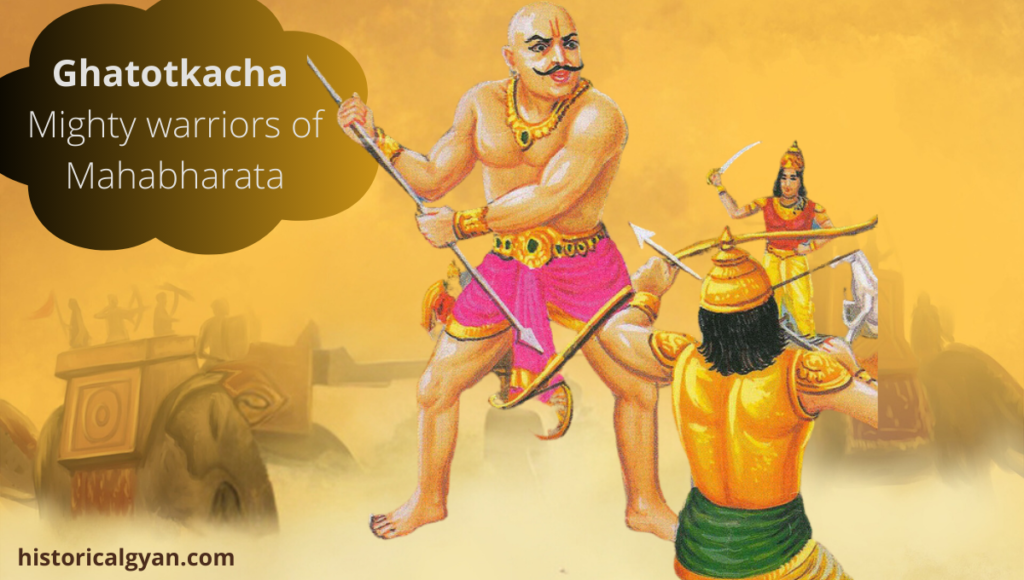
Ghatotkacha’s Heroic Exploits
Ghatotkacha’s role in the Kurukshetra War was pivotal, as his supernatural abilities turned the tide of battle on multiple occasions. His battle prowess extended to defeating powerful rakshasas on the Kaurava side, including Alambusha and Alayudha. In the thick of battle, Ghatotkacha singlehandedly decimated more than one Akshauhini army of the Kaurava forces, striking fear into the hearts of his adversaries.
On the 14th day of the war, Ghatotkacha’s aerial attacks and immense size posed a significant threat, forcing Karna to use the Shakti weapon. The cataclysmic impact of this weapon caused Ghatotkacha to fall, crushing thousands of Kaurava soldiers beneath him.
Ghatotkacha’s unique blend of rakshasa might and mystical abilities made him a formidable warrior on the side of the Pandavas, leaving an indelible mark on the annals of the Mahabharata.
7. Bhima: The Indomitable Strength
Bhima, the second Pandava, was a powerhouse of raw strength and valor. His martial prowess and sheer physical might made him a force to be reckoned with on the battlefield. Bhima’s list of achievements includes defeating all one hundred Kaurava brothers, culminating in a fateful duel with Duryodhana on the 18th day, which marked the end of the Kurukshetra War.
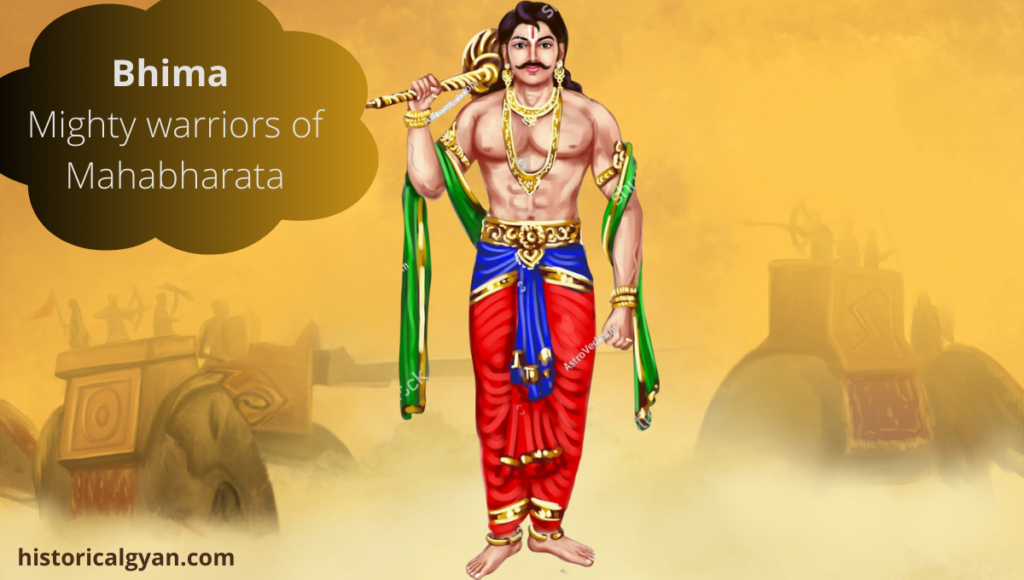
Bhima: The Son of Vāyu
Bhima’s exceptional strength was attributed to his divine parentage. Born of Vāyu, the wind god, he possessed unrivaled might and courage. His proficiency in mace fighting was second only to Duryodhana’s, making him an invaluable asset to the Pandava side.
Bhima’s Heroic Feats
Bhima’s journey in the Mahabharata was marked by extraordinary feats of valor. In a wrestling duel, he vanquished formidable opponents like Jarasandh and Bakasura. His most notable achievement came during the Kurukshetra War, where he singlehandedly defeated all one hundred Kaurava brothers.
On the final day of the war, Bhima’s might prevailed as he killed an entire Akshauhini army of the Kaurava side. His list of defeated opponents also included warriors like Drona and Kripa.
Bhima’s indomitable spirit and unparalleled strength were instrumental in securing victory for the Pandavas, culminating in his duel with Duryodhana, where he emerged triumphant.
8. Duryodhana: The Mace Fighter
Duryodhana, the eldest Kaurava, was renowned for his prowess in mace combat. His mastery over the mace made him a formidable adversary on the battlefield. Duryodhana’s tenacity and skill were evident in his ability to take on all the Pandavas, their soldiers, and even challenge five of them simultaneously in a group attack during the Kurukshetra War.
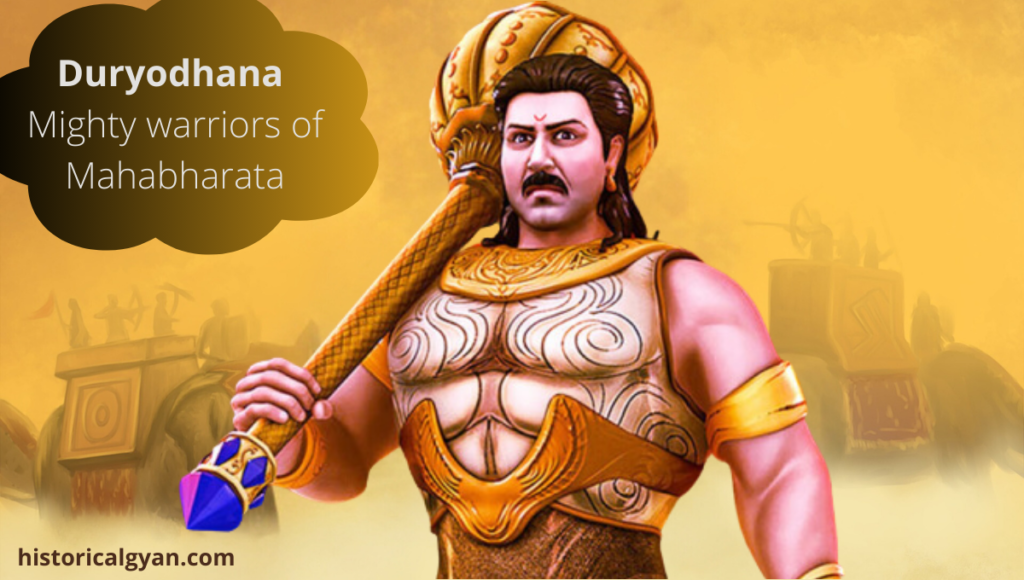
Duryodhana: The Son of Gandhari and Dhritarashtra
Duryodhana’s lineage as the son of Gandhari and Dhritarashtra was marked by his unyielding determination. His expertise in mace fighting was unparalleled among the Kauravas, earning him a formidable reputation.
Duryodhana’s Martial Prowess
Duryodhana’s martial prowess was most prominently displayed during the Kurukshetra War. His ability to counter the Pandavas, their soldiers, and even challenge five Pandavas simultaneously in a group attack was a testament to his skill with the mace. Notably, he came close to defeating Bhima in a mace duel, a confrontation that ended in Bhima resorting to an unfair tactic to secure victory.
Duryodhana’s list of defeated opponents included warriors like Satyaki, Bhima, and others. His relentless pursuit of victory and his unwavering resolve made him a formidable adversary on the battlefield.
The Fateful Mace Duel
Duryodhana’s final showdown came in the form of a mace duel with Bhima on the 18th day of the Kurukshetra War. In a fiercely contested battle, Bhima emerged victorious, marking the end of the war. Duryodhana’s legacy as a skilled mace fighter was sealed in this epic duel, where his determination met its final test.
9. Abhimanyu: The Youthful Courage
Abhimanyu, the valiant son of Arjuna, exemplified youthful courage and exceptional combat skills. Trained by his illustrious father, Lord Krishna, and Lord Balram, Abhimanyu was a warrior of great promise. His heroic attempt to penetrate the Chakravyuha formation during the Kurukshetra War showcased his brilliance on the battlefield, even though it ended in a tragic and unfair slaying.
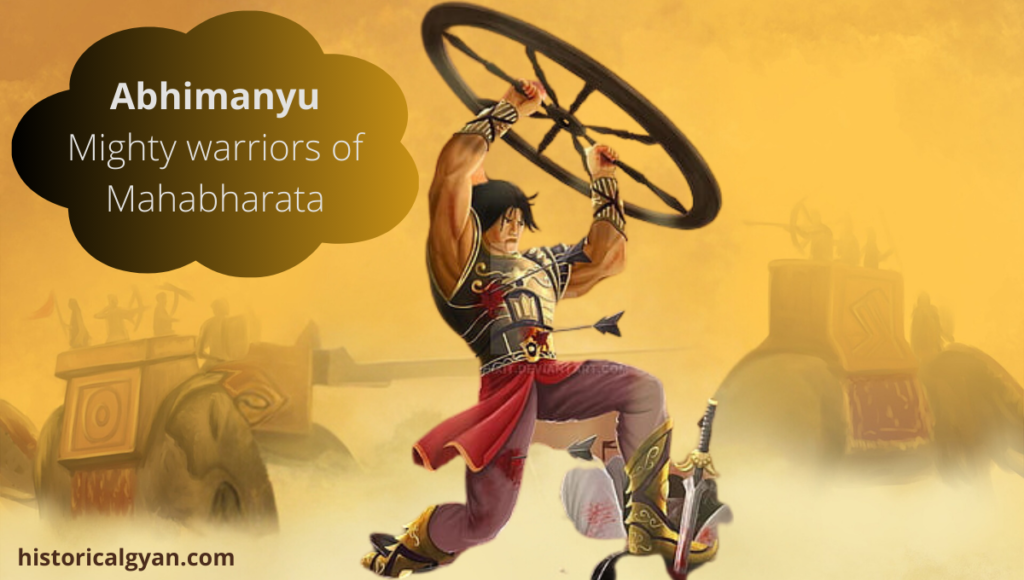
Abhimanyu: The Son of Arjuna
Abhimanyu’s lineage as the son of Arjuna was marked by high expectations. He received training from some of the greatest warriors and mentors of his time, including Arjuna, Lord Krishna, and Lord Balram. His youthful spirit and courage made him a beloved figure among the Pandavas.
Abhimanyu’s Audacious Feat
Abhimanyu’s most iconic moment in the Mahabharata was his audacious attempt to break through the Chakravyuha, a formidable military formation. Despite his tender age, Abhimanyu displayed exceptional knowledge and skill in warfare. His valiant efforts held the entire Kuru host, including Drona, Karna, and numerous heroic warriors, at bay singlehandedly.
Tragically, Abhimanyu’s life was cut short in an act of deceit and unlawful slaying. Despite the unfair circumstances of his demise, his heroic effort and unwavering resolve in the face of insurmountable odds made him an enduring symbol of youthful courage.
10. Bhagadatta: Master of the Elephant
Bhagadatta, a prominent warrior on the Kaurava side, was renowned for his exceptional skills in elephant warfare. His formidable elephant, Supratika, was a force to be reckoned with on the battlefield. During the Kurukshetra War, Bhagadatta fired a potent weapon known as Vaishnavastra at Arjuna, a weapon that had the potential to cause immense destruction. However, Arjuna’s life was saved by the timely intervention of Lord Krishna.
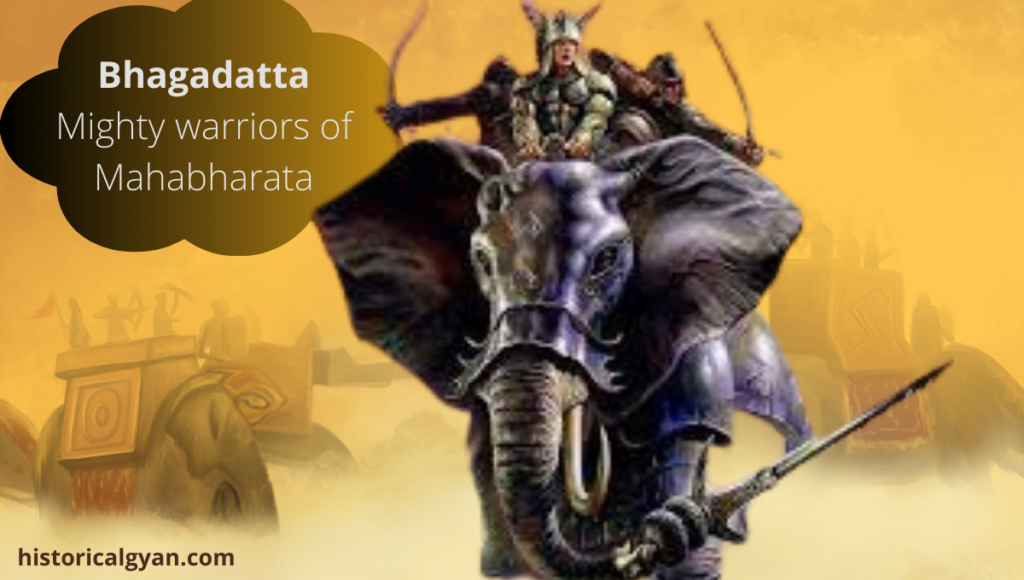
Bhagadatta: The Elephant Warrior
Bhagadatta’s mastery lay in his expertise in elephant warfare. Riding atop his mighty elephant, Supratika, he posed a formidable challenge to the Pandava forces. Supratika’s immense size and strength made it a potent weapon of war.
Bhagadatta’s Encounter with Arjuna
One of the most notable incidents involving Bhagadatta was his use of the Vaishnavastra, an irresistible weapon, against Arjuna. This weapon had the potential to inflict catastrophic damage. However, Arjuna’s life was spared thanks to the selfless intervention of Lord Krishna. Krishna positioned himself as a cushion to absorb the impact of the weapon, saving Arjuna from certain doom.
Bhagadatta’s role in the Kurukshetra War, particularly his formidable elephant warfare, showcased the diversity of skills and weapons on the battlefield.
Conclusion
The Mahabharata, with its rich tapestry of characters and intricate plot, continues to be a source of inspiration and fascination. These top 10 Mighty warriors of Kurukshetra in Mahabharata, each with their unique attributes, contributed to the epic battle that defines the essence of the Mahabharata.

